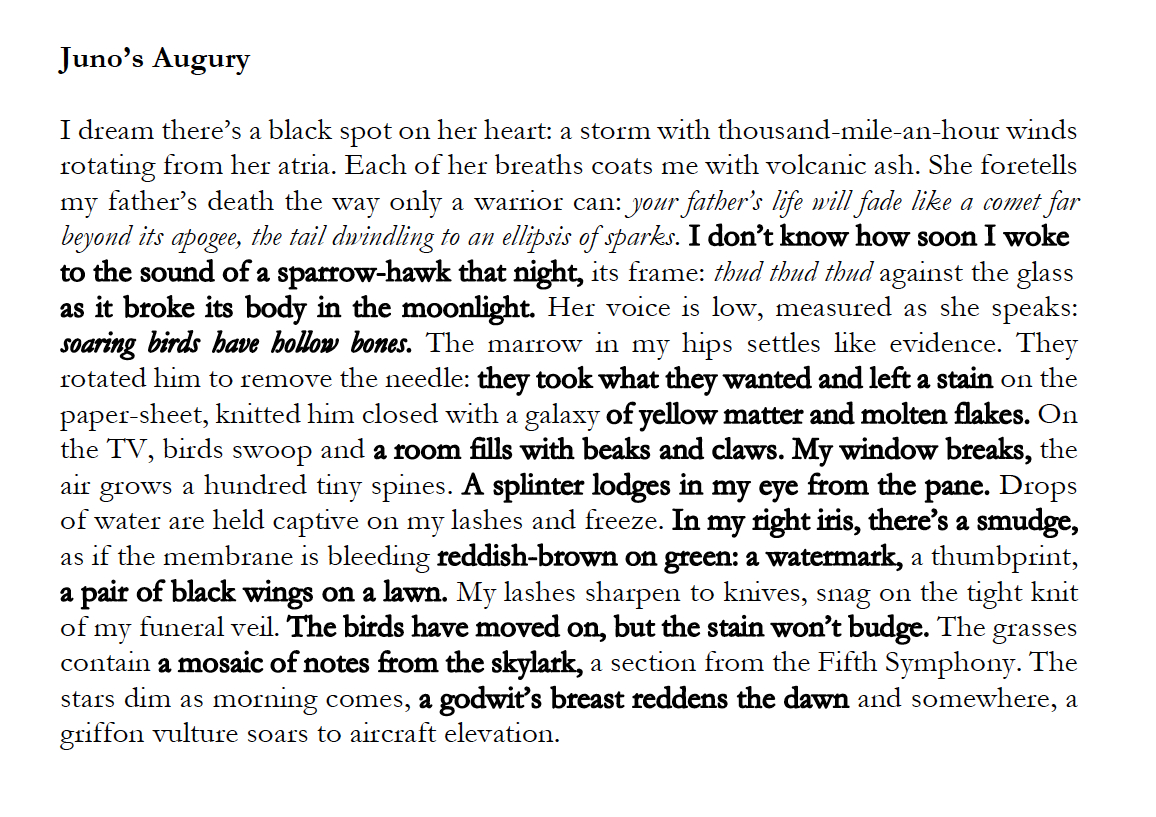The Winner
We are delighted to announce the Winner of the 2017 Cafe Writers Open Poetry Competition, judged by Liz Berry, is Tammy Armstrong with her poem Road Salt Dome.
Road Salt Dome
after Paul Farley
Off the highway, out of the way
like ant hills, or bee hives, or megalithic tombs
where queens or poets might be interred
beside the bones of zithery greyhounds
the salt domes sweat their densities of opal
their little summer songs, dry-mouthed and stung.
They wait for winter, that stylized season,
to send out the first removal fleets
their berths sway-backed with moony-lit salt
their headlights homed onwards
to suburban beats of nothing-new and all-the-same
a thousand shivery roads below the plow’s midnight thrum.
I’ve dreamt of these sleeping beauty mines
their unsealable mouths gaping dark
in wait for rough-handed men to return with their trucks and shovels
men who seek answers in the after-storm’s Auto Trader
in the news that old kings, battle-fought and broken,
have been found again beneath pay-by-the-hour car parks.
What is it that makes me want to end here
the mind lost to the mineral air of finished things:
fighting men loose in late night snow
and my mother in a terrycloth robe
seeding the half-light of November ice
with salt fractured with high-beam
already singing its bite
down into our boots’ leather
sidewinding its chalky etch along our heels.
It’s all here, off the highway, in an asphalt-shingled tomb,
and one night, before the men return, I’ll bring you
to hear for yourself these little locked-away songs
where the moon gives up, lets go
and light breaks a thousand cubes into blossom.
 Tammy Armstrong has published two novels and four books of poetry, most recently The Scare in the Crow and the upcoming chapbook, The Varying Hare (Frog Hollow Press). Her work has recently won the iYeats International Poetry Prize, Geist’s Postcard Story Contest, Prairie Fire‘s Bliss Carman Poetry Prize, and has been short-listed for The Malahat Review‘s Open Season Awards, The Fiddlehead‘s Ralph Gustafson Prize and long-listed for the CBC Poetry Prize. In autumn 2018, she will be a Fellow at the International Writers’ and Translators’ House in Latvia. She currently lives in a lobster fishing village on the south shore of Nova Scotia. http://w3.stu.ca/stu/sites/nble/a/armstrong_tammy.html
Tammy Armstrong has published two novels and four books of poetry, most recently The Scare in the Crow and the upcoming chapbook, The Varying Hare (Frog Hollow Press). Her work has recently won the iYeats International Poetry Prize, Geist’s Postcard Story Contest, Prairie Fire‘s Bliss Carman Poetry Prize, and has been short-listed for The Malahat Review‘s Open Season Awards, The Fiddlehead‘s Ralph Gustafson Prize and long-listed for the CBC Poetry Prize. In autumn 2018, she will be a Fellow at the International Writers’ and Translators’ House in Latvia. She currently lives in a lobster fishing village on the south shore of Nova Scotia. http://w3.stu.ca/stu/sites/nble/a/armstrong_tammy.html
Second prize goes to Elisabeth Sennitt Clough for Juno’s Augury:
 Elisabeth Sennitt Clough is the author of Glass (Best Pamphlet Saboteur Awards 2017) and a full collection, Sightings (Michael Schmidt Award for Best Portfolio). A poem from Sightings was published in the Forward Book of Poetry 2018. Other poems have appeared in Ink, Sweat & Tears, The Rialto, Poem, Mslexia, Magma and Stand. http://elisabethsennittclough.co.uk/
Elisabeth Sennitt Clough is the author of Glass (Best Pamphlet Saboteur Awards 2017) and a full collection, Sightings (Michael Schmidt Award for Best Portfolio). A poem from Sightings was published in the Forward Book of Poetry 2018. Other poems have appeared in Ink, Sweat & Tears, The Rialto, Poem, Mslexia, Magma and Stand. http://elisabethsennittclough.co.uk/
And third prize goes to Sarah Westcott for Fair Maids of February:
Fair Maids of February*
Little milk flower
trembling in the first light
barely a cotton skirt
its ragged hem almost elegant –
So many of you this morning!
White headscarves drawn tight
over the quiet graves
all wormy and downy –
Sweetest girls,
under the ivy and yew
tend your tapered
lives with light.
O suffer the little children –
their faces in the darkest hours
on street corners, under lights,
their lovely necks bowed.
*A folk name for the Snowdrop.
 Sarah Westcott’s collection Slant Light is published by Pavilion Poetry. Her poems have appeared in magazines including Poetry Review and Magma, and on beermats, billboards and the side of buses. Recent awards are the London Magazine poetry prize and the Manchester Cathedral prize. https://www.sarahwestcott.co.uk/
Sarah Westcott’s collection Slant Light is published by Pavilion Poetry. Her poems have appeared in magazines including Poetry Review and Magma, and on beermats, billboards and the side of buses. Recent awards are the London Magazine poetry prize and the Manchester Cathedral prize. https://www.sarahwestcott.co.uk/
(Photo by Matthew Pull)
Our commended poets are: Lia Brooks (Batts Corner Shrews); Patrick Holloway (the grass is always fucking greener); Ayesha Drury (Notes for an Architecture of Loss); Theresa Lola (Black Marilyn); S.M.H Davies (Bethany the Reader in November) and Fiona Larkin (Waking Moon).
Jenny Pagdin wins the Norfolk Prize for Eight Deaths:
Eight deaths
i
black burns on his hairline and soles,
his rigid hand still closed round the umbrella
ii
only a faint, but leading into dreams –
colourful dreams that lined the ceiling like smoke
iii
his lips still bared in a grimace,
now blue; the punchline never reached.
iv
his plaiting, writhing brain, after an unseen spirit
coerced him into drinking salt.
v
quietly slipping from his hard chair
during the wedding feast
vi
looking directly at the sun,
blood falling from his nose
vii
tiny practice bounces, as if the window-ledge
were a springboard
viii
his whole house fetid, eggy,
the air opaque as apricots.
 Born in High Wycombe, 1979, into a middle-class British-Lebanese family, Jenny Pagdin studied BA English at Oxford University and MA Creative Writing at the University of East Anglia. She lives with her husband and son in Norfolk where she works as a charity fundraiser. Her first pamphlet, Caldbeck, was shortlisted for the Mslexia pamphlet competition (2017). Her work has appeared in Iota, Agenda Broadsheet, Nth Position, The Frogmore Papers and Dream Catcher.
Born in High Wycombe, 1979, into a middle-class British-Lebanese family, Jenny Pagdin studied BA English at Oxford University and MA Creative Writing at the University of East Anglia. She lives with her husband and son in Norfolk where she works as a charity fundraiser. Her first pamphlet, Caldbeck, was shortlisted for the Mslexia pamphlet competition (2017). Her work has appeared in Iota, Agenda Broadsheet, Nth Position, The Frogmore Papers and Dream Catcher.
And Julian Stannard wins the prize for the funniest poem:
The Crucible
I dream of being that snooker player whose opponent
is so masterful there’s nothing doing but to sit alone
in one’s sartorial splendour occasionally sipping a glass of water
knowing that the camera is zooming in to investigate
your existential gloom, listening to the click of ball on ball
and the ripple of applause which accompanies your opponent’s
unassailable lead. One needs to look the part, in defeat
as well as victory, certain that the pundits are making sly remarks
or even revealing a sudden sympathy for your spluttering career;
one of the best dressed players on the circuit, they’re thinking,
yet one of the least successful.
You realise that you’re actually fond of the sitting position,
a ring side view is not without advantages:
you find yourself remembering a wind in the trees and somewhere
there’s a beach and the black sliding into its pocket is perfection,
even a kind of death. You’re unexpectedly happy and you want
to hug your opponent, not just shake his hand; you want to hug him
like a brother, like a friend, like a lover, and the coloured balls
remind you of a Mexican Fiesta even though they’ve long slunk off
into the undergrowth. You feel like Siegfried or a workman
who’s finished his shift at last – the sitting shift – who can now
lie down and relax and drink something stronger than water.
In fact you can’t wait to kick off your shoes and the table is like
a manicured lawn – Please Keep Off – but now that you’ve lost
so stylishly, so effortlessly, you’re going to lie down
on the grass, certain they will forgive you this indulgence,
given that you’ve spent so much time banished from the garden.
You can hang yourself with a tie but a bow-tie is like a fig leaf
which covers up your shame and because you’ve suffered such
a staggering defeat you’re going to take it off and that’s just the start.
You remember the wind and the beach and you’re running free,
a trail of clothes behind you – naked, blissful, snookered.
 Julian Stannard teaches English and Creative writing at the University of Winchester; his most recent book is What were you thinking? (CB Editions, 2016); a podcast interview with the Poetry Society can be listened to here : https://soundcloud.com/poetrysociety/emily-berry-talks-to-julian-stannard
Julian Stannard teaches English and Creative writing at the University of Winchester; his most recent book is What were you thinking? (CB Editions, 2016); a podcast interview with the Poetry Society can be listened to here : https://soundcloud.com/poetrysociety/emily-berry-talks-to-julian-stannard
And finally, Liz Berry’s judge’s report:
From the first heavy box to the final sheaf, the poems submitted for the Cafe Writers competition filled me with excitement and inspiration. There were terrible poems and brilliant poems, short poems, long poems, poems in wild and wonderful voices, poems which spoke their parts very plainly. I am always fascinated to peep inside the heads of the poets out there, to find out what moves people to write and the ways in which they try to express and explore their longings. Many of the poems were very well crafted and competent, a gem for any magazine. Yet even the clumsy ones found ways to move me, with their sincerity or their rawness. It was fairly easy to choose the top forty poems, much harder to choose the final twenty and very hard indeed to select the winners. My four year old son was furious to see the growing pile of ‘not-quite-this-time’ poems. “No no, they are all the winners, Mommy!” he shouted at me. And in a way he is right because to make a poem, to engage in something creative and attentive in a world which increasing guides us only to consume is a beautiful and important thing and that must not be forgotten. So well done and thank you to all who were brave and hopeful enough to write their poems and send them off into the world.
But choose I must and so here are the winners, the poems which struck me the most. I chose them the only way I know how, with a mix of head and heart, and I carried the them with me for a good few weeks, reading them again and again in different places to narrow them down. They are all accomplished and wonderful in completely different ways.
First
Road Salt Dome
I found this poem utterly enchanting. It takes one of the most mundane subjects I can imagine – a storehouse for road salt – and transforms it into a magical, otherworldly kingdom, where “queens or poets might be interred/beside the bones of zithery grey-hounds”. The language is lush, lyrical and ambitious; full of music. The imagery slowly knits to create something spellbinding . I found the ecstatic ending just gorgeous. Bravo!
Second
Juno’s Augury
Dark and densely wrought, this poem uses a clever woven form in which the reader can find three different poems, three different versions, which wind in and out of each other in a fascinating choiric structure. It opens with the compelling “I dream there’s a black spot on her heart: a storm with thousand-mile-an-hour winds rotating from her atria” and immediately we are hooked. The poem is full of powerful symbolism, a great deal of mystery and a brilliant sense of the unsettling. A poet I wanted to read more of.
Third
Fair Maids of February
I loved this wild, delicate little poem about snowdrops from first glance. It’s at once beautiful and troubling, crafted with a careful touch. Again, it holds something mysterious, mixing life with the “wormy… downy” grave; mixing the vulnerability of the small flower with the vulnerability of young women. The final stanza just floored me.
Commended
Black Marilyn – Oh this audacious, bold poem won me over straight away. The voice is just irresistible and it’s fresh as a daisy from its opening to that gorgeous startling last line. More please.
the grass is always fucking greener– What a joyous rollercoaster of language and imagery. This poem rolls and riffs and then lets go entirely.
Bethany the Reader in November – A very well-crafted, delightfully tender poem. “How could I not love her?” it asks and I felt the same.
Notes for an Architecture of Loss – This poem intrigued me. It weaves in folk song, a painterly landscape study and an extraordinary moment of longing between lovers. I came back to it again and again.
Waking Moon – There were many parenting poems submitted but this one shone for its lovely tenderness and beautifully sustained image of the night-waking hours and the tiny child’s head as the moon.
Batts Corner Shrews – This poem stayed with me long after I’d read it, asking me to look again and again. Unsettling and deeply moving.
Norfolk Poem
Eight Deaths – Each of these eight sections contains a perfect and brilliantly chosen image of a sticky ending. Lovely dark stuff!
Funniest Poem
The Crucible – Funny poems are so hard to write and many of those submitted for the competition relied too heavily on familiar tricks and clunky rhyme. “The Crucible” was a breath of fresh air – brilliantly crafted, delightfully surreal and very funny too. Hurrah and well done!
I also have a special fondness for the wonderfully vulgar “Fifteen Shades of Black Country” which sent my entire extended family into hysterics on Christmas day.
